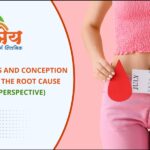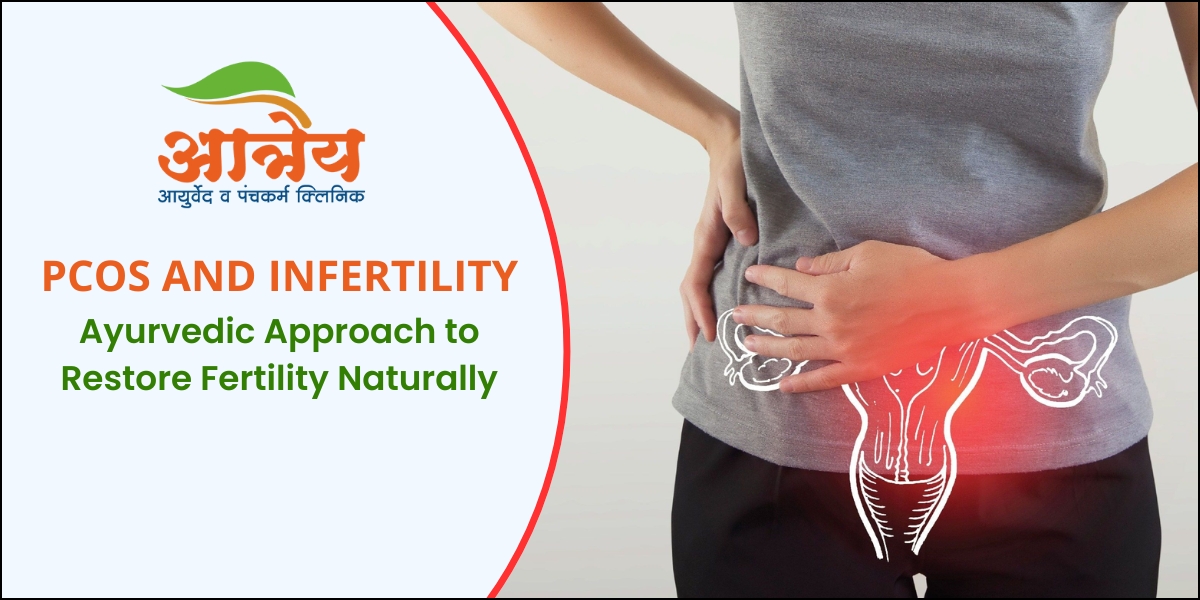Polycystic Ovary Syndrome (PCOS) has become one of the most common causes of infertility in women today. Irregular periods, hormonal imbalance, weight gain, and difficulty conceiving are challenges many women face due to PCOS. While modern medicine often manages PCOS with hormonal pills or fertility drugs, Ayurveda offers a natural, holistic approach that works on the root cause and restores balance in the body.
In this blog, we’ll explore how PCOS leads to infertility, and how Ayurveda helps women conceive naturally.
What is PCOS?
PCOS is a condition where the ovaries produce excessive androgens (male hormones), leading to multiple small cysts on the ovaries. This hormonal imbalance disturbs ovulation and menstrual cycles, making it difficult to conceive.
Common Symptoms of PCOS:
- Irregular or absent periods
- Difficulty in conceiving
- Weight gain, especially around the abdomen
- Excess facial or body hair (hirsutism)
- Acne and oily skin
- Hair thinning
How PCOS Causes Infertility?
For conception, a woman must release a healthy egg each month (ovulation). In PCOS:
- Ovulation becomes irregular or absent.
- Hormonal imbalance (especially high androgens and insulin resistance) prevents proper egg maturation.
- Poor egg quality affects conception and pregnancy outcomes.
This is why PCOS is one of the leading causes of infertility among young women.
Ayurvedic Understanding of PCOS & Infertility
In Ayurveda, PCOS can be understood as a disorder of Kapha dosha along with Vata imbalance. Excess Kapha leads to meda dhatu vruddhi (increased fat tissue), insulin resistance, and cyst formation. Vata imbalance disturbs artava vaha srotas (reproductive channels), leading to irregular ovulation.
Infertility arises when Shukra Dhatu and Artava Dhatu are not in balance. Hence, the Ayurvedic approach works on:
- Restoring hormonal balance
- Improving ovulation
- Detoxifying the body
- Nourishing reproductive tissues
Ayurvedic Solutions for PCOS & Infertility
1. Panchakarma Detox
Specialized Panchakarma treatments like Virechan (detox through purgation), Basti (medicated enema), and Uttarbasti help in balancing hormones, clearing channels, and regulating cycles.
2. Diet (Ahara) for PCOS
- Avoid junk food, refined sugar, and deep-fried items (increase Kapha).
- Include whole grains, fresh vegetables, fruits, and legumes.
- Use spices like turmeric, cinnamon, fenugreek, and cumin to improve metabolism.
- Warm water instead of cold water helps digestion and balances Kapha.
3. Lifestyle (Vihara)
- Regular exercise, yoga, and pranayama to reduce stress and maintain healthy weight.
- Adequate sleep – sleeping late worsens hormonal imbalance.
- Stress management is crucial as mental stress directly impacts fertility.
4. Ayurvedic Herbs (General)
- Ashoka & Lodhra – regulate menstrual cycles
- Shatavari – nourishes Artava Dhatu (female reproductive tissues)
- Guduchi & Triphala – detoxify and balance metabolism
- Cinnamon & Fenugreek – improve insulin sensitivity
(Note: Always consult an Ayurvedic physician for personalized treatment.)
5. Yoga & Pranayama for PCOS
- Bhujangasana (Cobra pose) – improves ovarian function
- Baddha Konasana (Butterfly pose) – strengthens pelvic muscles
- Kapalbhati & Anulom-Vilom – regulate hormones and reduce stress
FAQs on PCOS and Infertility
Q1. Can Ayurveda cure PCOS permanently?
Ayurveda aims at balancing hormones, correcting menstrual cycles, improving ovulation, and addressing root causes like lifestyle and diet. While “permanent cure” depends on individual factors, consistent Ayurvedic treatment and lifestyle changes can significantly reduce symptoms and restore fertility.
Q2. How does Ayurveda treat infertility caused by PCOS?
Ayurveda works on improving Ras Dhatu and Artava Dhatu (female reproductive tissues), detoxifying the body through Panchakarma, and using Rasayana therapies to restore natural ovulation and hormonal balance.
Q3. What diet is recommended for women with PCOS in Ayurveda?
- Include fresh vegetables, whole grains, pulses, and fruits.
- Use warm, light, easily digestible food.
- Avoid excessive sweets, fried and packaged food.
- Adding spices like turmeric, cinnamon, and fenugreek can help regulate metabolism.
Q4. Can stress make PCOS and infertility worse?
Yes. Stress disturbs hormonal balance, impacts ovulation, and worsens insulin resistance. Ayurveda emphasizes stress management through yoga, pranayama, meditation, and dinacharya (daily routine).
Q5. How long does Ayurvedic treatment take for PCOS-related infertility?
Improvement depends on body type and severity, but many women notice better cycles, improved ovulation, and enhanced fertility within 3–6 months of regular Ayurvedic treatment and lifestyle correction.
Q6. Is Panchakarma necessary for PCOS?
Not always, but Panchakarma like Virechan (detox), Basti (medicated enema), or Uttar Basti can be highly effective in balancing hormones, removing toxins, and regulating the reproductive system in stubborn cases.
Visit Aatreya Ayurved Clinic for the best infertility solution in Pune
PCOS may feel like a roadblock in your fertility journey, but Ayurveda offers a natural, sustainable way to restore balance and improve chances of conception. By combining detox therapies, diet, herbs, yoga, and lifestyle modifications, Ayurveda helps not only in treating PCOS but also in enhancing overall reproductive health.
If you are struggling with PCOS and infertility, Visit Aatreya Ayurved Panchkarma & Infertility Clinic in Hadapsar Pune and consult an experienced Ayurvedic doctor for a personalized fertility program. With patience and consistent effort, natural conception is possible.
Our Clinic Address – 3rd floor, Sopan Park ,Dagdusheth Tupe Patil, Chowk, DP Rd, above Hotel Siddheshwar foods, Hadapsar, Pune
Contact Number : +91 9860007992







